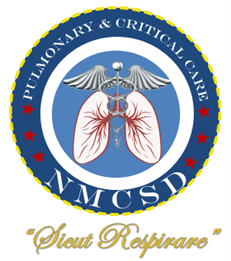- Rotation Director: Navaz Karanjia M.D. (nkaranjia@ucsd.edu)
- Rotation Location: UCSD Jacobs Center
- Rotation Duration: Two 2 week blocks
- Trainees/month: One or Two
Educational Purpose and Rotation Description:
The Neurocritical Care rotation at UCSD Medical Center will provide the PCCM fellow with valuable experience in the management of critically ill patients with a broad range of neurological diseases. The fellow working under the supervision of an attending Neurointensivist and as member of a multidisciplinary team, will manage adult male and female patients on the UCSD Neurointensive Care Service. In addition to direct patient care, the fellow is responsible for supervising and teaching resident physicians assigned to the team.
Rotation Objectives:
- Acquire knowledge of:
- Intensive care management of acute cerebrovascular disorders such as subarachnoid hemorrhage, intracerebral hemorrhage, ischemic stroke, and cerebral sinus thrombosis.
- Neurotrauma including traumatic brain injury and spinal cord injury.
- Disorders and diseases such as status epilepticus and refractory seizure, neuromuscular diseases, myasthenia gravis, Guillain-Barre Syndrome, ALS, and Creutzfeldt Jacob disease.
- Muscle-related conditions like rhabdomyolysis and toxic myopathies, critical illness myopathy/neuropathy.
- Infections like encephalitis, meningitis, brain, and spinal epidural abscess.
- Toxic metabolic disorders, neuroleptic malignant syndrome/malignant hyperthermia, serotonin syndrome, and drug overdose and withdrawal.
- Temperature-related injuries (hyperthermia, hypothermia).
- Inflammatory and demyelinating diseases such as multiple sclerosis, neurosarcoidosis, acute disseminated encephalomyelitis (ADEM), CNS vasculitis, and central pontine myelinolysis.
- Neuroendocrine disorders like pituitary apoplexy, diabetes insipidus, panhypopituitarism, thyroid storm and coma, myxedema coma, and Addisonian crisis.
- Neuro-oncology including brain tumors and metastases, spinal cord tumors and metastases, carcinomatous meningitis, and paraneoplastic syndromes.
- Encephalopathies such as eclampsia, hypertensive encephalopathy, hepatic encephalopathy, uremic encephalopathy, hypoxic-ischemic and anoxic encephalopathy, and MELAS.
- Clinical syndromes like coma, herniation syndromes with monitoring & ICP, elevated intracranial pressure, intracranial hypotension/hypovolemia, hydrocephalus detection & treatment, cord compression, death by neurologic criteria, end of life issues, and organ donation.
- Other neurological conditions such as vegetative state, dysautonomia, reversible posterior leukoencephalopathy, and psychiatric emergencies (psychosis).
- Develop competence in critical care techniques and procedures:
- Airway management
- Central venous catheter insertion including dialysis catheters
- Arterial line placement
- Ventilator management
- Cardiac Output Monitoring
- Conscious and deep sedation
- Interpretation of continuous EEG monitoring
- Interpretation and management of ICP/CPP data
- Brain tissue Oxygen monitoring
- Administration of intravenous and intraventricular thrombolysis
- Interpretation of CT/MR standard imaging and perfusion studies
- Interpretation of cerebral angiography
- Perioperative and postoperative clinical evaluation of neurosurgical and interventional patients
- Induction and maintenance of therapeutic coma
- Induction and management of therapeutic temperature modulation including hypothermia and
- controlled normothermia including management of shivering
- Ultrasound Flow studies (TCD, Carotid)
- Gain experience in the evaluation and management of patients with nervous system dysfunction requiring critical care and intensive monitoring. The fellow will learn the application of critical care principles in the provision of care to patients with acute neurological conditions and trauma victims with complex multiorgan dysfunction.
Learning Venues and Teaching Methods:
Direct Patient Care:
- Neurocritical Care Unit, USCD Jacobs Med Center
- Surgical ICU, UCSD
Conferences:
- Daily Conferences- provided by NCC Attendings/Fellows.
- Critical Care Conference/Neurology Conferences
Suggested Reading Material:
- Decision making in Neurocritical Care. Edited by Jen Frontera
- Intensive Care Medicine. Edited by Rippe, Taylor, Alpert, and Fink. Little Brown.
- ENLS Online Course
- UCSD Neurocritical Care Protocols: available at neurocriticalcare.ucsd.edu
Evaluation:
The fellow will receive oral and written feedback. This feedback will be based on cognitive, patient management, procedural and humanistic skills. This evaluation, including areas for improvement, will be discussed personally with the fellow at the end of the rotation. Written feedback submitted via My Evaluations will be forwarded to the Program Director for inclusion in the trainee’s permanent file.
